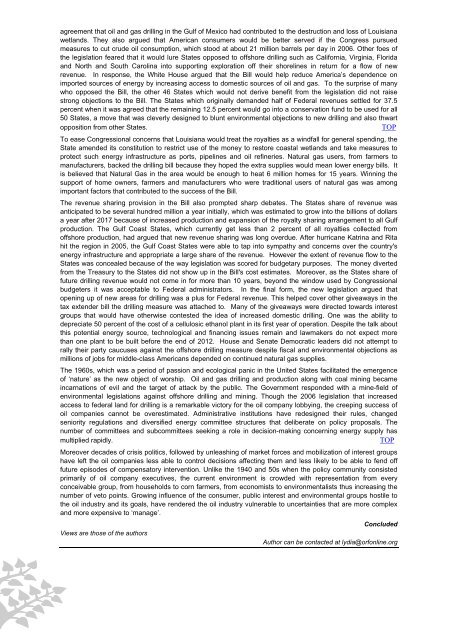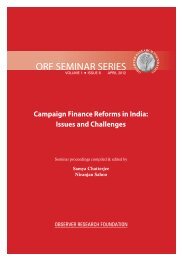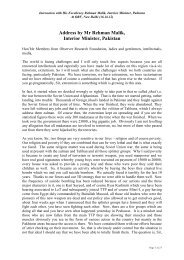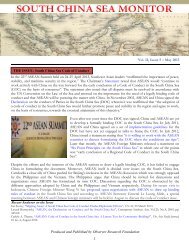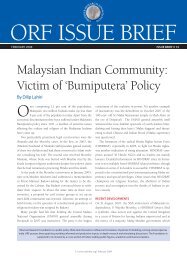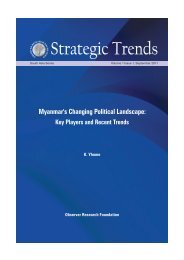ORF ENERGY NEWS MONITOR - Observer Research Foundation
ORF ENERGY NEWS MONITOR - Observer Research Foundation
ORF ENERGY NEWS MONITOR - Observer Research Foundation
You also want an ePaper? Increase the reach of your titles
YUMPU automatically turns print PDFs into web optimized ePapers that Google loves.
agreement that oil and gas drilling in the Gulf of Mexico had contributed to the destruction and loss of Louisiana<br />
wetlands. They also argued that American consumers would be better served if the Congress pursued<br />
measures to cut crude oil consumption, which stood at about 21 million barrels per day in 2006. Other foes of<br />
the legislation feared that it would lure States opposed to offshore drilling such as California, Virginia, Florida<br />
and North and South Carolina into supporting exploration off their shorelines in return for a flow of new<br />
revenue. In response, the White House argued that the Bill would help reduce America’s dependence on<br />
imported sources of energy by increasing access to domestic sources of oil and gas. To the surprise of many<br />
who opposed the Bill, the other 46 States which would not derive benefit from the legislation did not raise<br />
strong objections to the Bill. The States which originally demanded half of Federal revenues settled for 37.5<br />
percent when it was agreed that the remaining 12.5 percent would go into a conservation fund to be used for all<br />
50 States, a move that was cleverly designed to blunt environmental objections to new drilling and also thwart<br />
opposition from other States.<br />
TOP<br />
To ease Congressional concerns that Louisiana would treat the royalties as a windfall for general spending, the<br />
State amended its constitution to restrict use of the money to restore coastal wetlands and take measures to<br />
protect such energy infrastructure as ports, pipelines and oil refineries. Natural gas users, from farmers to<br />
manufacturers, backed the drilling bill because they hoped the extra supplies would mean lower energy bills. It<br />
is believed that Natural Gas in the area would be enough to heat 6 million homes for 15 years. Winning the<br />
support of home owners, farmers and manufacturers who were traditional users of natural gas was among<br />
important factors that contributed to the success of the Bill.<br />
The revenue sharing provision in the Bill also prompted sharp debates. The States share of revenue was<br />
anticipated to be several hundred million a year initially, which was estimated to grow into the billions of dollars<br />
a year after 2017 because of increased production and expansion of the royalty sharing arrangement to all Gulf<br />
production. The Gulf Coast States, which currently get less than 2 percent of all royalties collected from<br />
offshore production, had argued that new revenue sharing was long overdue. After hurricane Katrina and Rita<br />
hit the region in 2005, the Gulf Coast States were able to tap into sympathy and concerns over the country's<br />
energy infrastructure and appropriate a large share of the revenue. However the extent of revenue flow to the<br />
States was concealed because of the way legislation was scored for budgetary purposes. The money diverted<br />
from the Treasury to the States did not show up in the Bill's cost estimates. Moreover, as the States share of<br />
future drilling revenue would not come in for more than 10 years, beyond the window used by Congressional<br />
budgeters it was acceptable to Federal administrators. In the final form, the new legislation argued that<br />
opening up of new areas for drilling was a plus for Federal revenue. This helped cover other giveaways in the<br />
tax extender bill the drilling measure was attached to. Many of the giveaways were directed towards interest<br />
groups that would have otherwise contested the idea of increased domestic drilling. One was the ability to<br />
depreciate 50 percent of the cost of a cellulosic ethanol plant in its first year of operation. Despite the talk about<br />
this potential energy source, technological and financing issues remain and lawmakers do not expect more<br />
than one plant to be built before the end of 2012. House and Senate Democratic leaders did not attempt to<br />
rally their party caucuses against the offshore drilling measure despite fiscal and environmental objections as<br />
millions of jobs for middle-class Americans depended on continued natural gas supplies.<br />
The 1960s, which was a period of passion and ecological panic in the United States facilitated the emergence<br />
of ‘nature’ as the new object of worship. Oil and gas drilling and production along with coal mining became<br />
incarnations of evil and the target of attack by the public. The Government responded with a mine-field of<br />
environmental legislations against offshore drilling and mining. Though the 2006 legislation that increased<br />
access to federal land for drilling is a remarkable victory for the oil company lobbying, the creeping success of<br />
oil companies cannot be overestimated. Administrative institutions have redesigned their rules, changed<br />
seniority regulations and diversified energy committee structures that deliberate on policy proposals. The<br />
number of committees and subcommittees seeking a role in decision-making concerning energy supply has<br />
multiplied rapidly.<br />
TOP<br />
Moreover decades of crisis politics, followed by unleashing of market forces and mobilization of interest groups<br />
have left the oil companies less able to control decisions affecting them and less likely to be able to fend off<br />
future episodes of compensatory intervention. Unlike the 1940 and 50s when the policy community consisted<br />
primarily of oil company executives, the current environment is crowded with representation from every<br />
conceivable group, from households to corn farmers, from economists to environmentalists thus increasing the<br />
number of veto points. Growing influence of the consumer, public interest and environmental groups hostile to<br />
the oil industry and its goals, have rendered the oil industry vulnerable to uncertainties that are more complex<br />
and more expensive to ‘manage’.<br />
Concluded<br />
Views are those of the authors<br />
Author can be contacted at lydia@orfonline.org


